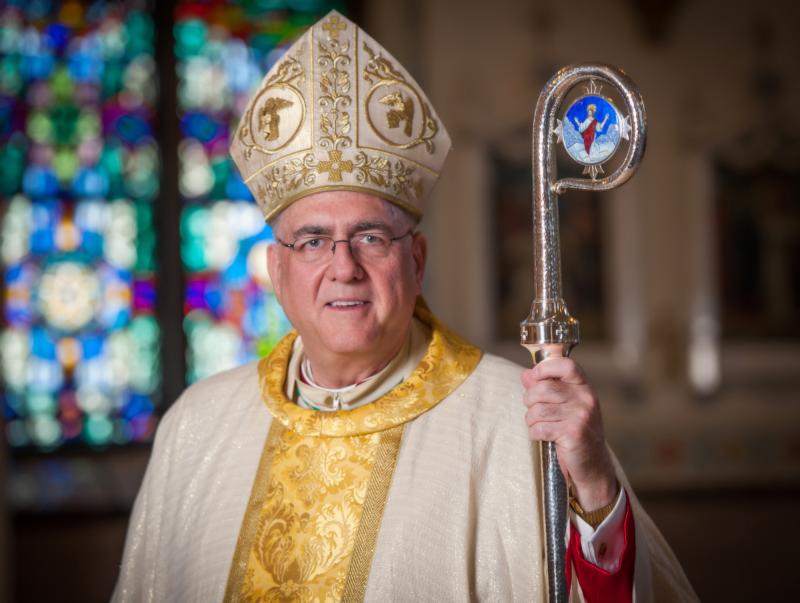
by Archbishop Joseph F. Naumann
We are one week closer to the end of the coronavirus crisis!
Father Bill McEvoy, pastor of St. Francis de Sales Parish in Lansing, sent me this take on the coronavirus safety measures: “FIRST TIME IN HISTORY WE CAN SAVE THE HUMAN RACE BY LAYING IN FRONT OF THE TV AND DOING NOTHING. LET’S NOT SCREW THIS UP!”
We have to keep a sense of humor. It is true. What we are being asked to do in our high-risk counties — to shelter in place is basically to do our best not to contract the virus and not to infect others.
On the Monday of the Third Week of Lent, the first reading for Mass was taken from the Fifth Chapter of the Second Book of Kings. It describes the gentile military officer Naaman, who had contracted leprosy, approaching the Jewish prophet Elisha for a healing.
When Elisha tells him to go wash seven times in the Jordan River, Naaman becomes indignant, because in his opinion there were better rivers in his homeland. Naaman was prepared to do something heroic or extraordinary for his healing. But to go wash seven times in the Jordan seemed just too inconsequential.
Naaman is convinced by one of his servants that it cannot hurt to try what Elisha requested. Naaman washes seven times in the Jordan and is healed.
As Christians, we have a responsibility to work for the common good.
All of us have a responsibility to do our best to avoid contracting the coronavirus — not only for our own safety, but also for the safety of others. Despite our best efforts, some of us will contract or perhaps already have contracted the coronavirus.
However, if we can minimize the number of cases, we can save lives. I urge you out of respect for the common good to follow what our public health officials are requesting.
As Christians, we see everything through the prism of the paschal mystery — the dying and rising of Jesus. God bringing forth good from evil, life from death, is a pattern that we recognize everywhere.
I have been impressed by the creativity of our priests and lay leaders in developing amazing ways to keep our parishioners spiritually nourished and our parish communities united during this extraordinary time.
While we are being voluntarily prevented from our ability to receive Our Lord in the Eucharist, many parishes are livestreaming the celebration of the Mass and encouraging parishioners to pray spiritual acts of Communion.
During this time when we are being isolated from so many usual human interactions, parishes are finding ways to keep connected with parishioners — especially those who live alone. Pastors are using modern technology to inspire and spiritually nourish their people.
Contrasting with pictures of some college students on beaches ignoring social distancing, the St. Lawrence Catholic Campus Center at the University of Kansas conducted a video conference with more than 100 student leaders exploring ways to be missionary disciples, while faithfully observing public health safety measures.
Through the use of social media, it is an opportune moment to witness to their peers the peace and joy that friendship with Jesus provides us even in the midst of the current crisis.
I am so grateful that we had the “Enflame Our Hearts” convocation this past October. Our Evangelization team is working through social media to empower our 1,500 delegates to help their pastors provide for the spiritual and pastoral needs of their parish communities and to take advantage of opportunities to witness to the joy of the Gospel, despite the many natural reasons to be overwhelmed with anxiety.
Our Enflame Adult Facebook participants grew from 4 to 900 people in just 5 days. You do not have to have been a convocation delegate to participate. All are welcome!
One of the unnerving aspects of the coronavirus is that it is a hidden enemy. The infected cells are so minuscule that we cannot see them with the naked eye. Another frightening aspect of the coronavirus is that it is so highly contagious.
We can learn something from this menacing threat to our health. Our Catholic faith should also be highly contagious.
The Gospel of Jesus, when it is lived authentically and beautifully, is irresistible. The joy of experiencing the friendship of Jesus and the awareness that we are beloved daughters and sons of a loving Father should radiate from us.
Our efforts to love others and to serve the community often in such seemingly small and barely perceivable ways are a potent means to transform a culture that was already — pre-coronavirus — suffering from an epidemic of loneliness and depression.
We have the vaccine to protect ourselves from despair. We have the antidote to loneliness and isolation. In this most difficult and trying of times, our ability to offer peace in the midst of the coronavirus storm will be like a magnet drawing people not to us, but to Jesus — the one who can vanquish fear and anxiety from our hearts.
Lying in front of the television and doing nothing might be a way to avoid the coronavirus, but disciples of Jesus are called to be doing so much more.
While defeating this public health enemy, we can also seize the opportunity to pray more, to love more, and to witness to the joy and hope of the Gospel more.
Let us infect our world with the truth, goodness and beauty of our Catholic faith!

